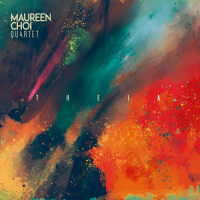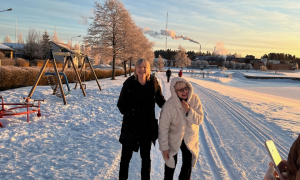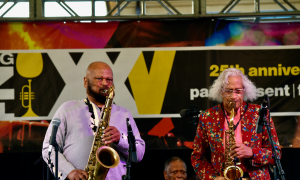Home » Jazz Articles » SoCal Jazz » Arturo Sandoval: Two Counties, Two Lives, One Trumpet de Oro
Arturo Sandoval: Two Counties, Two Lives, One Trumpet de Oro

When they caught me listening to jazz, they put me in jail for three months. They said that I was listening to the voice of the enemy.
—Arturo Sandoval
All About Jazz: This is an off-the-cuff way to start an interview with one of the great musicians of our time, but as an animal lover, I just have to ask you about Coco and Chanel. You clearly adore your beautiful pups. I'm guessing they are much loved and part of the family.
Arturo Sandoval: You know what, those two dogs are a son and daughter to us. We love them so much. There are no words to tell you how much we love them. They are both part of our family.
AAJ: What kind of dogs are they?
AS: They are both Pomeranian.
AAJ: Nice.
AS: Yes, I will tell you that Coco sleeps by my side every night. They are both very special to us. The only problem is that when I am on the road, I miss them so much.
AAJ: And you have been on the road extensively of late, including a one-week residency at the Blue Note in New York City. How did that go? What kind of reception did you receive?
AS: You know, the Blue Note is very famous and there are a lot of tourists from all over the world. It's a place everybody wants to go. We played eight shows at the Blue Note, and eight shows at Blues Alley in Washington, DC. All the shows were sold out. All of them. We really enjoyed it very much.
AAJ: I've had some musicians tell me that they can't quite blow like they used to back in their twenties, and conversely, others say that they are now playing better than ever due to all the many years of experience. Where do you weigh in on that conversation?
AS: I am seventy years old and to be honest I was told that after sixty-five that I was going to slow down a lot and play a lot less gigs. But it has been the other way around. I've got more gigs than ever. I'm working so hard. I am overwhelmed at the amount of gigs that I have at my age.
AAJ: That's terrific. And you still feel good and as strong as ever playing?
AS: It's unbelievable, man. Yes, I am very lucky. My health is very good. I am one hundred percent. I have no health problems at all.
AAJ: It isn't uncommon to hear a musician say that they need a new horn, or different mouthpiece, or whatever else to get new sounds or the sounds they want. You have said that, and I quote, "The sound is made in your head." Could you expand on that?
AS: You must imagine the kind of sound you want to produce. If you can imagine that sound, then you will be able to get it. You practice a lot. I still practice a lot. I have no choice. I have to practice a lot. The dedication is a daily mission. I'm happy because I am doing what I love. I still feel very strong. Sometimes I can play higher than when I was thirty or forty years old.
AAJ: Wow. That's pretty amazing in your case. I mean you can really take it up there.
AS: Also, I use much bigger equipment than before. A few years ago, I changed my horn and my mouthpieces. I'm using a much bigger horn and bigger mouthpieces that are the same ones they use in symphony orchestras.
AAJ: What made you make those changes?
AS: Because more and more I enjoyed a fat big sound. I'm not talking about the volume. I am talking about the quality of the sound.
AAJ: You're talking about the tone.
AS: Exactly. I enjoy that fat sound. It's warm. When I play a ballad it's like a singer. I love that warm sound.
AAJ: The first day he met you Dizzy Gillespie once said, in reference to you, "What the Hell is my driver doing with a trumpet in his hands?" Could you share that story with us?
AS: I picked him up at the harbor in Cuba. He came there on a jazz cruise through the Caribbean. They stopped in Havana for a couple of days. I picked him up and showed him Havana for the very first time. He had never been there before. I drove him around for a few hours. That night they organized kind of a jam session with a bunch of great musicians. There was Stan Getz, Earl Hines, and many more. We all played together. I was warming up back stage and when he saw me he said, "What the Hell is my driver doing with a trumpet in his hands?"(it should be clarified here that at no time while Sandoval was taxiing Gillespie around did he mention anything about being a musician). Someone than told him that I was a trumpeter and well known in Cuba. Dizzy still said, "Hell no, he's my driver!" (a good laugh is now shared). We ended up jamming together that night. That was such a beautiful night for me.
AAJ: You went on to have quite a connection with Gillespie.
AS: We traveled to New York. We played the Newport Jazz Festival. We played at Carnegie Hall. I played with his small group and with the United Nations Orchestra. I played with Dizzy for many years, up until he passed
AAJ: You and Dizzy became life-long friends. What can you tell us about Dizzy as a mentor and colleague?
AS: He was so much more than that. He was like a second father to me. He was extremely nice and gave me so many opportunities. He always kept me in mind and helped me so much. It was a very special relationship. I have always appreciated it so very much. It was a daily lesson. He was always ready to teach or share something with me. He was just such a music lover. He loved music so much.
AAJ: Going back to the beginning, how old were you when you started to play? What came first, the trumpet, the piano, or percussion?
AS: The trumpet. The trumpet came first. Percussion was just a little bit. It was never too important to me. The piano came much later for composing, orchestrations, and improvisations. It is very crucial for all of that.
AAJ: I believe you were only about 12 when you joined the Orchestra de Cubana Musica Moderna.
AS: No, I was fifteen years old.
AAJ: What was that experience like?
AS: That was my first big gig. I grew up in a little village and started playing with some local musicians. This was mostly traditional Cuban music. Then I got a three-year scholarship to get classical training. So far at had never heard jazz at all. I was playing only Cuban music and classical music. Then one day a journalist asked me if I had ever heard jazz. I said, "What is that?" He played for me a record by Dizzy Gillespie and Charlie Parker. Wow. I was so impressed. I still remember that moment very well. That moment changed my brain upside down.
AAJ: It changed your life.
AS: Absolutely. It absolutely did.
AAJ: How did it come to be that you once spent 3 months in jail for the "crime" of listening to music?
AS: That is correct. I was in the Cuban military service for three years. The only way we had to listen to some jazz was through a short-wave radio. There was a jazz hour on the Voice of America from Washington, DC. Man, when they caught me listening to that they put me in jail because they said I was listening to the voice of the enemy.
AAJ: That's just unbelievable when you think about that nowadays.
AS: Oh yes. This was really something.
AAJ: You challenged and walked a thin line when you, along with Paquito D'Rivera and Chucho Valdes, formed Irakere. Experimenting with fusion was well against Cuba's laws and sensibilities. You must have needed to be as creative in deception as you were with the music. How did you manage to get away with it?
AS: It was difficult, But the main thing is to keep your hopes alive. It doesn't matter how difficult it is. You have to keep going, keep practicing, keep learning, keep hoping that someday you will have the opportunity to play the music you love. I always kept in mind that I wanted to leave the country. Yeah, I really wanted to leave the country. I had that in my head all the time. I didn't do it before because I was married with a son and I didn't want to leave them behind. I was waiting for that opportunity. As soon as Ii had the first opportunity, trust me, I took it.
AAJ: Despite all the barriers and downsides of Cuba, is there anything about Cuba that you miss?
AS: To be honest, I was struggling so much and suffering so much with the feelings of tension and humiliation that I don't miss anything. My close family, everybody, is in the US. Thanks to God. I see my son grow up here and be so successful. He is a graphic designer and has his own company. We are extremely grateful to God that we live in this wonderful country that we love dearly.
AAJ: You have said that you have had two lives. Your second life has included 10 Grammys, 19 nominations, opportunities to play at the White House, the Super Bowl, and being awarded the Presidential Medal of Freedom. Certainly, more than you could ever had imagined. How does it feel to have reached this level of success and to be so well appreciated and respected?
AS: I always believe that I am in the middle of the road. I appreciate but I don't seek awards. I just keep practicing and working hard as if I were a teenager. My most appreciated rewards are the audiences clapping at the end of a performance. That is very rewarding for me and gives me a lot of enthusiasm. I just desire to keep working hard because that experience that you get when you are in front of the audience, when you see the people enjoy and admire what you do, oh my goodness that is such a unique kind of feeling.
AAJ: There is nothing more special than that.
AS: No sir. No sir, there is not.
AAJ: I am very respectful of the fact that you have given so much back to our society. Particularly to children. Tell us about the work you do and the opportunities you provide for children and low-income families.
AS: For the last five years we have an organization in Los Angeles called ASI. The Arturo Sandoval Institute. We have been helping a lot of children with private lessons, with scholarships, with opportunities, and with instruments. We are very glad to be able to do this and to help a lot of kids.
AAJ: Then too, there are your master classes.
AS: I do them all year long and for free. I do them on the internet on YouTube and on Facebook. People can have a couple of hours for free. My mission is to be at peace with God and that I can sleep well at night knowing that I did my best to help people.
AAJ: I know that family is very important to you. You talked about how well your son is doing and how proud you are of him. What else what can you tell us about your lovely bride Marianela and your family?
AS: This year will be forty-four years. We were married in 1975.
AAJ: Congratulations. That's wonderful.
AS: Thank you so much. Marianela and I love each other more every day. We have such a beautiful relationship. She is my best friend. She is my best advisor. She is on my side one hundred percent for everything, in good times and in bad. Yes, my son does art installations and movie animations. He is a very hard-working dedicated man. His wife, my daughter in law, is also my manager. And we have a lovely granddaughter.
AAJ: That's great to have someone you can trust as your manager. That can be an issue for a lot of musicians.
AS: You bet. Its so good to have someone on your side that you feel is doing the absolute best for you.
AAJ: What was it like to work with Clint Eastwood? Did you enjoy writing the score for Mule?
AS: Oh, it was terrific. Just last week he told me that he will be doing another movie soon and that he will be giving me the score one more time. He is an amazing guy. He is an icon of the American culture. Besides that, he is just a beautiful beautiful person. It was a big honor for me to work with him. We had a great time. I am really looking forward to doing it again with him.
AAJ: You, of course, have recorded a large collection of exceptional music. Impossible to talk about it all, so I narrowed it down to just one. One that speaks volumes. That being Flight to Freedom(GRP, 1991). You can just hear the passion and feel the pent-up explosion that needed to come out in that first record after defecting from Cuba. It must have been very gratifying and exhilarating to make that record.
AS: Yes, that was wonderful, and I had special guests on the album. So special to do that first one after coming to the US. Also, let me tell you about my favorite album. I've got like forty-four albums. My favorite one is Trumpet Evolution(Crescent Moon Records, 2003). It is my favorite by far.
AAJ: Why is that your favorite?
AS: Because it is my tribute to all the greatest trumpet players that came before me. Studying them was like going to school for me. So much inspiration. It is my tribute, my homage to all of the great ones. I consider myself to be a good imitator. I imitated nineteen players from almost one hundred years. Starting with 1920 there was almost one hundred years of the history of the trumpet sound. It was a beautiful experience and I am so happy that I did it.
AAJ: Obviously Dizzy Gillespie would be one, but if you were to name three or four other trumpeters that influenced you the most who would they be?
AS: Clifford Brown, Timofei Dokshizer, Harry James, and Clark Terry. Many others of course. I am a big fan of Woody Shaw, Freddie Hubbard, Maynard Ferguson and Maurice Andre. You know, I love all the great trumpet players. I love all of them.
AAJ: Around the world, in most countries, jazz is revered, highly appreciated, and respected. Unfortunately, this is not so much the case here in the United States. Why do you think that is? What do we need to do to change that?
AS: You know, I have lived in this country for thirty years. In all that time I have never seen one minute on television of jazz. I consider that a crime. It's very unfair. We must protect jazz and keep the legacy alive. We don't get enough help from the media. And know we have another problem. All the jazz festivals, mainly in the US, are booking all kind of acts. This is a big problem. They want to go more commercial or do whatever but if we don't have our festivals what is left? Only the jazz clubs? That's it? We need help from the media to let the younger people know about it.
AAJ: Yeah, where is jazz going to be twenty years from now?
AS: Oh yeah! This is the most profound and important style of music that has been created in the United States. The rest of the world appreciates it more. Which is difficult to believe, but it is true. You go to Europe or Asia in the prime time on a Saturday night at 9pm on the major networks you can easily watch a couple of hours from jazz festivals. That never happens over here. Never. Why is that? (rhetorical)
AAJ: You mention the jazz clubs. I believe you have expanded the size of your touring band.
AS: Yes. I am very happy with this band. Very talented and very dedicated people. I'm blessed to have such a band. And yes, I have added another keyboard player and a guitarist. So, it is an eight-piece band now.
AAJ: Excellent. That should be impactful.
AS: Yes. We like to shake it up sometimes. We need to bring food to our table.
AAJ: An Arturo Sandoval performance is always a feast. I have great respect for you sir. It was a great honor and privilege to speak with you today.
Tags
SoCal Jazz
arturo sandoval
Jim Worsley
United States
California
Palm Springs
Dizzy Gillespie
Stan Getz
Earl "Fatha" Hines
Charlie Parker
Paquito D'Rivera
Chucho Valdes
Timofei Dokshizer
Harry James
Clark Terry
Woody Shaw
Freddie Hubbard
Maynard Ferguson
Maurice Andre
PREVIOUS / NEXT
Arturo Sandoval Concerts
Support All About Jazz
 All About Jazz has been a pillar of jazz since 1995, championing it as an art form and, more importantly, supporting the musicians who make it. Our enduring commitment has made "AAJ" one of the most culturally important websites of its kind, read by hundreds of thousands of fans, musicians and industry figures every month.
All About Jazz has been a pillar of jazz since 1995, championing it as an art form and, more importantly, supporting the musicians who make it. Our enduring commitment has made "AAJ" one of the most culturally important websites of its kind, read by hundreds of thousands of fans, musicians and industry figures every month.



























